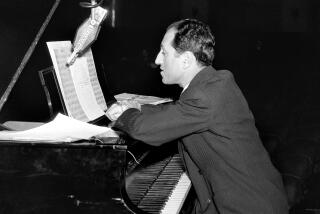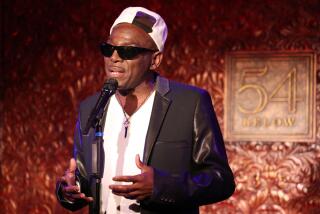Betty Allen dies at 82; mezzo-soprano and music teacher
Betty Allen, one of the first African American singers to reach prominence on the international opera stage, died June 22 of complications from kidney disease at a hospital in Valhalla, N.Y. She was 82.
If contralto Marian Anderson in the 1930s and 1940s represented the first generation of black opera stars, then Allen belonged to the second, along with Leontyne Price and Shirley Verrett and Grace Bumbry.
At the height of her vocal power from the 1950s through the 1970s, Allen “sang with a glory of sound that would honor any performance,” wrote Washington Post critic Paul Hume. Even as a performer in her 20s, she earned the respect of conductor and composer Leonard Bernstein, who invited her to sing in his “Jeremiah” symphony.
Allen was a mezzo-soprano, meaning that her voice was lower than that of a soprano. While sopranos tend to play glamorous or delicate women, mezzos are often cast as evil or brooding ones, and Allen played those roles to their fullest.
She made her formal operatic debut in 1964 at the Teatro Colón in Buenos Aires as Jocasta in Stravinsky’s “Oedipus Rex”; Jocasta hangs herself at the end. She said Azucena, the raving gypsy in Giuseppe Verdi’s “Il Trovatore,” was her favorite role because “she’s absolutely nuts.”
With the Metropolitan Opera, she sang in “Four Saints in Three Acts,” an opera by Virgil Thomson and Gertrude Stein. Thomson, the highly respected composer and music critic, would later write music specifically for her.
Off stage, Allen distinguished herself as a teacher and mentor. She was the executive director of the Harlem School of the Arts and taught at the Manhattan School of Music, among other places. She was particularly devoted to introducing classical music to children who, like her, had grown up in poverty.
Elizabeth Louise Allen was born in Campbell, a steel boomtown in northeastern Ohio, on March 17, 1927. Her father worked in the steel mills, her mother as a laundress with the two Maytag machines the family owned. Allen first heard opera arias as they floated from neighbors’ windows during the Met’s radio broadcasts.
“The families on my street were mostly Sicilian and Greek,” she told the New York Times. “On Saturday, walking down the street, you could hear the . . . broadcasts coming from the windows of everybody’s house. No one told them that opera and the arts were not for them, not for poor people, just for rich snobs.”
As an adolescent, Allen lost her mother to cancer, and her father began drinking heavily. She left home one day, caught a bus to nearby Youngstown and put herself up for adoption.
“That judge didn’t know what to do with me,” she told the New York Times. “In those days, there was no orphanage for black children. You either had to be put in a detention home or you were put in a foster home. I chose to be put in foster homes.”
A scholarship took her to Wilberforce College in Ohio, a historically black school. She had planned to study languages and become a translator, but that changed when a professor who had been an opera performer urged her to join the college chorus. There she became convinced that she could have a career as a singer. She later attended the Hartford School of Music in Connecticut and what is now the Tanglewood Music Center in Massachusetts.
Survivors include her husband, Ritten Edward Lee II of Bronxville, N.Y.; two children, Anthony Lee of Bronxville and Juliana Lee of the Bronx; and three grandchildren.
Langer writes for the Washington Post.
More to Read
The biggest entertainment stories
Get our big stories about Hollywood, film, television, music, arts, culture and more right in your inbox as soon as they publish.
You may occasionally receive promotional content from the Los Angeles Times.






